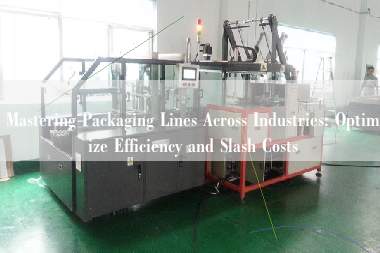
Core Differences in Packaging Lines Across Industries
Packaging automation solutions are not universal templates. Manufacturing sectors operate under divergent operational parameters, product characteristics, and regulatory frameworks. Understanding these fundamental variations determines successful packaging line implementation. Yanmao Intelligent Equipment (Suzhou) engineers industry-specific solutions by addressing three critical dimensions: material requirements, automation thresholds, and environmental controls.
Packaging Imperatives in Food, Pharmaceutical, and Electronics Sectors
Food packaging prioritizes contamination prevention and shelf-life extension. High-speed throughput becomes essential for perishable goods. Pharmaceutical operations demand absolute sterility compliance with FDA/EMA regulations. Traceability systems track individual units through serialization. Electronics packaging focuses on component protection. Anti-static measures shield sensitive circuitry. Moisture barriers prevent corrosion during storage and transit. Material choices vary accordingly – food uses food-grade plastics, pharmaceuticals require sterile barrier pouches, while electronics often employ conductive poly bags.
Tailoring Automation Intensity to Industry Workflows
Automation levels must align with production volumes and precision requirements. Food manufacturers frequently implement high-velocity Integrated Case Erecting-Packing-Sealing Systems. Yanmao deployed such a solution for a frozen vegetable processor achieving 120 cartons/minute. Robotic Palletizers stack finished goods without temperature fluctuation. Pharmaceutical lines incorporate precision Bag Inserting Machines for sterile instrument packaging. These systems maintain ISO Class 5 environments during liner placement. Electronics assembly adopts slower, precision-oriented Case Packers. Custom end-effectors handle fragile PCBs without static discharge.
Designing for Critical Environmental Controls
Specialized environments dictate packaging machinery specifications. Cleanroom pharmaceutical applications require stainless steel Case Sealers with IP69K washdown ratings. Air filtration systems maintain positive pressure. Electronics facilities need ESD-safe Robotic Palletizers with grounded conveyors. Humidity sensors trigger desiccant deployment in moisture-sensitive zones. Food processing environments integrate antimicrobial belt materials and CIP (Clean-in-Place) protocols. Yanmao modifies standard Case Erectors with FDA-compliant lubricants and crevice-free designs for allergen zones. Drum packaging systems for chemicals add vapor containment hoods during Liner Insertion.
How to Choose the Most Cost-Effective Packaging System?
Packaging automation investments require strategic financial alignment with operational goals. Yanmao Intelligent Equipment designs solutions balancing capital expenditure against measurable productivity returns across manufacturing scales. Decision-making involves analyzing throughput requirements against three economic dimensions: enterprise capacity, industry-specific cost drivers, and lifecycle operational expenses.
Balancing Automation Investment and Output for Different Scale Enterprises
Production volume thresholds dictate optimal automation levels. Small-batch manufacturers (under 5,000 units/day) benefit from semi-automatic Case Sealers requiring one operator, achieving 15-20 cartons/minute. Mid-size facilities processing 20,000 daily units implement Robotic Palletizers with 30% labor reduction. High-volume plants exceeding 50,000 units deploy Integrated Case Erecting-Packing-Sealing Systems. A petrochemical client reduced drum handling costs 45% using Yanmao’s automated Liner Insertion System at 55-gal drum/minute throughput. Electronics assemblers gain ROI through precision Case Packers minimizing ESD-related scrap rates. Food processors offset higher equipment costs with 24/7 operation – frozen pizza lines recoup automation investments within 14 months through 3-shift labor savings.
Food Industry High-Speed Lines vs Luxury Precision Packaging: Cost Structure Analysis
Packaging economics diverge sharply between high-volume and high-value sectors. Food automation prioritizes throughput efficiency: Integrated Case Systems handling 120+ cartons/minute command $350,000-$500,000 investments. Justified by $0.023/unit operational costs versus manual $0.057/unit. Luxury goods packaging focuses on precision tooling. Watch manufacturers utilize $85,000 Case Packers with micro-suction end-effectors, increasing packaging accuracy to 99.98% despite 8-10 units/minute speeds. Cost-per-unit reaches $2.15 but prevents $400,000 annual damage claims. Cosmetics lines blend both models: $220,000 Robotic Packaging cells handle 60 premium bottles/minute with scratch-resistant grippers, maintaining <0.1% defect rates at $0.31/unit.
Hidden Cost Traps in Packaging Automation
Total cost of ownership extends beyond equipment price tags. Energy consumption varies significantly: Standard Case Erectors draw 4.2 kW/hour versus high-efficiency models at 2.8 kW/hour – saving $18,000 annually in continuous operations. Maintenance commitments differ; Bag Inserting Machines for woven poly bags require $3,200/year in consumables, while drum Liner Insertion Systems need quarterly $1,500 servo motor calibrations. Changeover time creates substantial hidden expenses: Traditional Case Sealers incur 45-minute format adjustments costing $380/downtime-hour. Yanmao’s rapid-conversion systems achieve SKU switches in <8 minutes using memory-preset tooling. Modular Robotic Palletizers reduce retooling costs 70% through programmable stacking patterns.
Future Packaging Line Technology Convergence Trends
Packaging automation evolves through interdisciplinary innovation. Yanmao Intelligent Equipment engineers systems where emerging technologies merge with industrial mechanics, creating adaptive production ecosystems. This technological convergence addresses three transformative vectors: quality assurance precision, cross-industry adaptability, and sustainable material handling.
Intelligent Sensing for Real-Time Quality Assurance in Food Packaging
Vision systems and hyperspectral sensors now integrate directly with Yanmao’s Case Sealers and Integrated Case Systems. Food processors deploy these technologies for continuous defect detection. Near-infrared spectroscopy identifies foreign contaminants in sealed cartons at 60 units/minute. Moisture sensors trigger automatic rejection when poly bag liners exceed 0.3% humidity thresholds. A dairy client achieved 99.97% seal integrity using thermal imaging cameras synced with Case Packers. Real-time data streams to plant dashboards, enabling predictive maintenance alerts. This sensor fusion reduces food waste by 18% while ensuring compliance with FDA 21 CFR Part 11 regulations.
Modular Design Architectures for Cross-Industry Transformation
Standardized interfaces allow component reconfiguration across sectors. Yanmao’s Palletizers incorporate swappable end-effectors: vacuum grippers for electronics transition to sanitary clamps for pharmaceuticals in 15-minute changeovers. Universal control platforms operate both cosmetic Case Packers and chemical drum systems. A multinational manufacturer saved $2.3 million using identical servo modules across food and industrial divisions. Plug-and-play conveyor segments adapt to varying throughputs – modules rated for 50 cartons/minute upgrade to 120 cartons/minute capacities. This interoperability slashes retrofitting costs by 40-60% during production line diversification.
Sustainable Material Handling in Chemical Packaging Evolution
Green packaging mandates drive mechanical redesigns. Yanmao’s Bag Inserting Machines now process compostable poly bags with 30% reduced tensile strength. Specialized drum handling systems accommodate 100% recycled HDPE containers prone to dimensional variance. Energy recovery systems capture 85% of braking energy from Robotic Palletizers. Chemical clients face unique challenges: bio-based liners require lower sealing temperatures, demanding precision thermal controls in Case Sealers. Abrasive recycled content accelerates wear – tungsten-carbide guides extend Liner Insertion System longevity by 7,000 operating hours. These adaptations maintain throughput while meeting EU Packaging Directive 94/62/EC sustainability targets.
